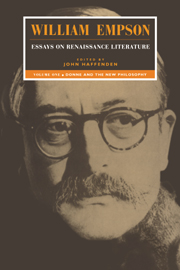Book contents
- Frontmatter
- Contents
- Preface
- Sources and acknowledgements
- Introduction by John Haffenden
- 1 Donne and the rhetorical tradition
- 2 Donne the space man
- 3 Donne in the new edition
- 4 Rescuing Donne
- 5 Donne's foresight
- 6 Copernicanism and the censor
- 7 Thomas Digges his infinite universe
- 8 Godwin's voyage to the moon
- Appendix on Galileo
- Notes
- Index
3 - Donne in the new edition
Published online by Cambridge University Press: 01 February 2010
- Frontmatter
- Contents
- Preface
- Sources and acknowledgements
- Introduction by John Haffenden
- 1 Donne and the rhetorical tradition
- 2 Donne the space man
- 3 Donne in the new edition
- 4 Rescuing Donne
- 5 Donne's foresight
- 6 Copernicanism and the censor
- 7 Thomas Digges his infinite universe
- 8 Godwin's voyage to the moon
- Appendix on Galileo
- Notes
- Index
Summary
The points which I hope to establish against Professor Gardner's account of Donne's love-poems (The Elegies and The Songs and Sonnets, ed. Helen Gardner, Oxford: Clarendon Press, 1965), in text and dating, may not seem very important; but to accept her ruling is to let an old controversy go by default. The current view has been taken for granted often enough, indeed for much too long, but only now is it consolidated by a claim to scientific proof; and the proof needs to be recognised as radically inadequate.
In the twenties, when I was young, it was a usual assumption among critics that Donne was somehow an advanced thinker, or at any rate an interesting one, who cast an independent eye on both church and state. Thus F. W. Payne said in his book on Donne (1926):
His correct interpretation of the effects of the dark beginnings of our modern science places him on a level with Mr H. G. Wells for piercing insight.
Everyone in the Eng. Lit. business under forty is deliciously outraged on hearing this sentence, but I still think that these authors both did have piercing insight. It was fair to get tired of critics like Payne because they did not say what Donne had seen, but Donne's use of astronomy gives a definite example. Professor Marjorie Nicolson could still say as late as 1935 {Studies in Philology):
The idea of a plurality of worlds, which Donne had suggested in his earlier poetry, was indeed for a churchman a dangerous tenet, even, as it came to be called, the ‘new heresy’.
- Type
- Chapter
- Information
- William Empson: Essays on Renaissance Literature , pp. 129 - 158Publisher: Cambridge University PressPrint publication year: 1993

